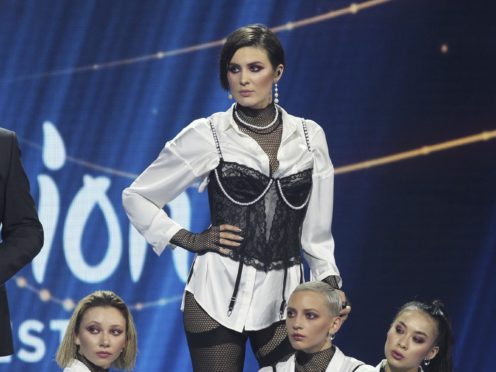Ukraine’s public broadcaster has refused to sign a contract with the performer who won the race to represent her country in the Eurovision Song Contest, amid a politically tinged argument rooted in the nation’s dispute with Russia.
Controversy erupted after 27-year-old singer Anna Korsun, who performs under the name of Maruv, won the national finals on Sunday to be Ukraine’s entry in the annual competition.
Several Ukrainian politicians argued Maruv should not be allowed to represent Ukraine in May in Tel Aviv, Israel, because she often performs in Russia.
Her tours in Russia have become a toxic issue because of the tug-of-war between the two neighbours following Russia’s 2014 annexation of Ukraine’s Crimean peninsula and support for separatist insurgents in Ukraine’s east.
🎉 42 countries will #DareToDream in Tel Aviv for Eurovision Song Contest 2019! pic.twitter.com/JJpX8v7x86
— Eurovision (@Eurovision) November 7, 2018
The Ukrainian National Public Broadcaster promptly offered Maruv a contract that temporarily bars her from performing in Russia among other conditions, saying she has 24 hours to sign it.
After the talks that lasted for most of Monday, the singer and the broadcaster said they had failed to reach agreement.
Maruv said on Facebook that she was ready to cancel shows in Russia but could not accept other stipulations of the contract that she said would amount to “censorship” and force her to engage in political propaganda.
“I’m a citizen of Ukraine, I pay taxes and I sincerely love Ukraine,” she wrote. “But I’m not ready to carry slogans and turn my involvement in the contest into a promo-action for our politicians. I’m a musician, not a tool for the political arena.”
The public broadcaster said the talks with Maruv failed to produce a “common vision” regarding her “mission” in the contest. It added in a statement that Ukraine’s Eurovision contender must be a “cultural ambassador” carrying the view of the Ukrainian public.
The broadcaster’s chief, Zurab Alasania, said in a Facebook post that the company will sign a contract with another performer who would represent the country.
The Ukrainian Culture Ministry weighed in, saying only “patriots who are aware of their responsibility” should be allowed to sing for Ukraine at the annual pop contest while “thousands of heroes are dying for Ukraine’s territorial integrity”.
Despite the outcry, it is not unusual for Ukrainian singers and bands to perform in Russia.
Maruv was grilled about her Russian shows during the national finals in Kiev over the weekend. Similarly, another entry, a duo of twins from Crimea, were put on the spot by the host and asked whether they consider Crimea to be part of Ukraine.
“Depending on your answer, you can either bury your own career or that of your mother,” the host said, referring to the women’s mother who is a judge in the Russia-controlled Crimea.
One of the sisters was brought to tears and said she would always stand by her parents if she were forced to choose between them and her career.
Eurovision has often become the pan-European platform for settling scores between countries.
When Ukraine hosted the competition in 2017, it refused to allow Russia’s performer to enter the country because she had performed in Crimea without the permission of the Ukrainian government.
A year earlier, a Ukrainian singer won the contest with 1944, a song about war-time deportations of Crimean Tatars from Crimea by Soviet leader Josef Stalin.
In 2009, the European Broadcasting Union vetoed the Georgian entry We Don’t Wanna Put In — interpreted as a dig at Russian President Vladimir Putin.
